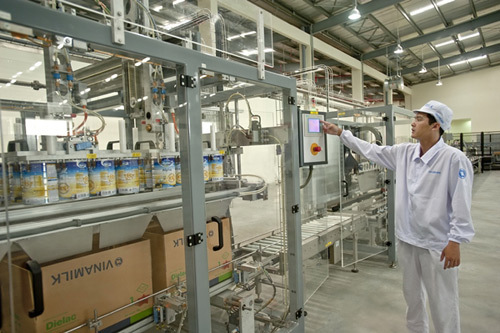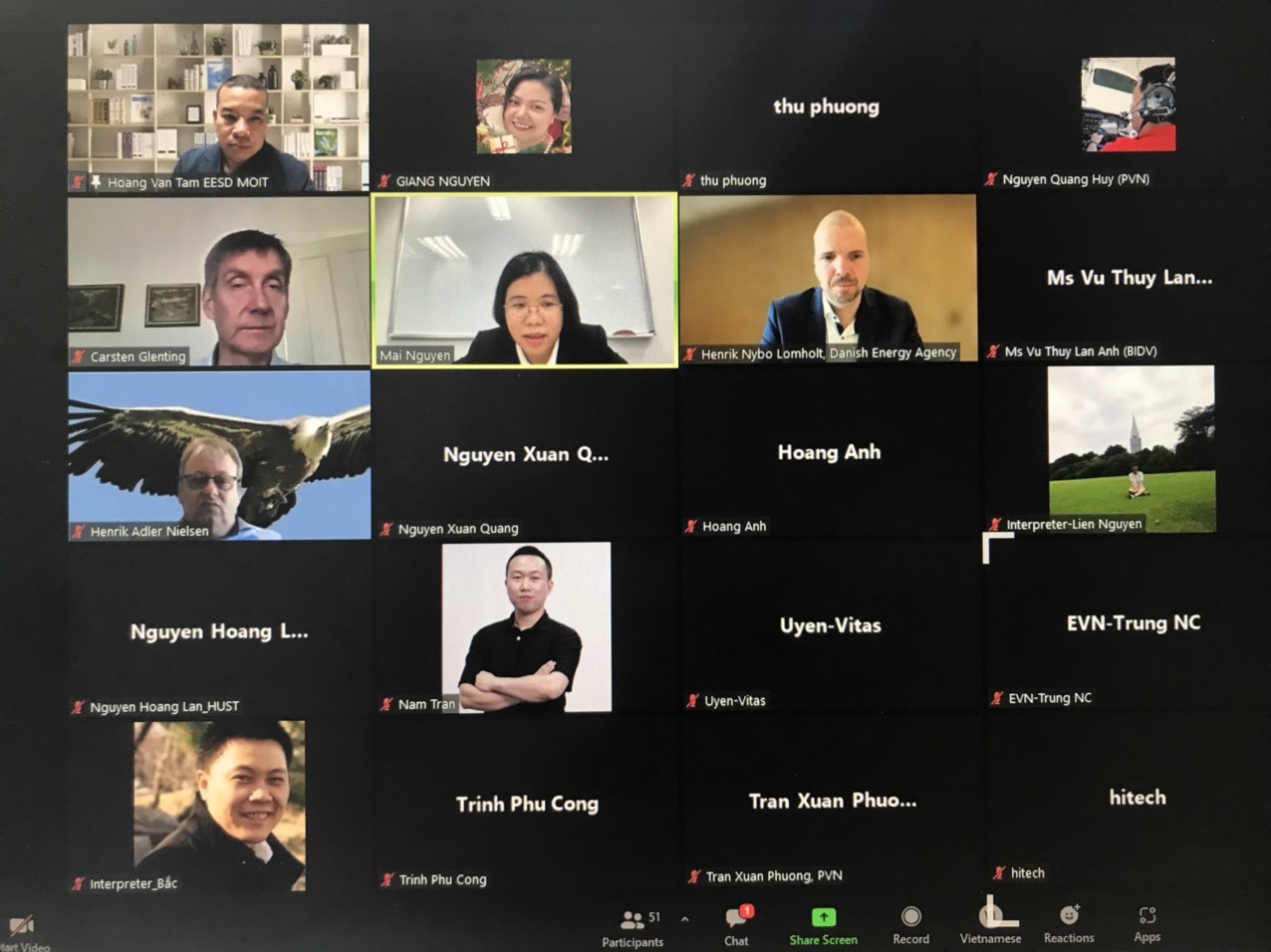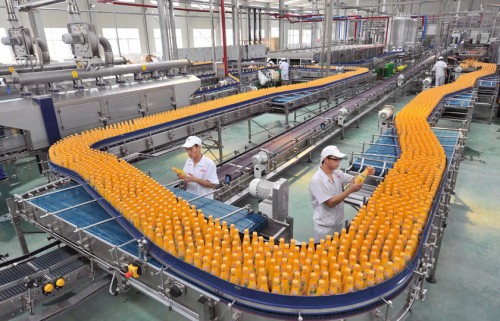Representatives of the Department of Energy Efficiency and Sustainable Development (Ministry of Industry and Trade), Danish Energy Agency (DEA), Departments of Industry and Trade, international organizations, banks, and enterprises.
Beginning of the workshop, Mr. Hoang Van Tam, representative of the Department of Energy Efficiency and Sustainable Development indicated that the workshop is an opportunity for partners, regulatory units, enterprises, financial supporting units, share their experience, take the chances, challenges, then build the effective common cooperating mechanism.
At present, policies on reducing greenhouse gas (GHG) emissions are being prioritized when the Law on Environmental Protection 2020 has officially taken effect. One of the important new contents is the regulations, roadmap, GHG emission reduction targets, and emission quotas in each field, sector, and sub-sector. In addition, international trade mechanisms have also changed in the direction of being stricter regarding environmental responsibilities and reducing carbon emissions.
Mr. Tam said that energy efficiency is a practical tool for enterprises to achieve the goal of reducing GHG emissions, improving the level of compliance with legal regulations on environmental protection. At the same time, it helps enterprises reduce costs and improve competitiveness, especially in industries with a high proportion of exports. Favorable financial and support mechanisms are important catalysts to promote energy efficiency projects.
Workshop on recommendations for the structure of and potential funding sources for an incentive scheme for the energy efficiency in the industry under the framework of the Vietnam - Denmark Energy Partnership Program for the period 2020-2025 (DEPP3 ). Screenshot of Workshop.
The need for a promotion mechanism
According to Mr. Nguyen Hoang Anh - an independent consultant (RCEE-NIRAS), so far, in the industrial sector, there have been many pilot cooperation programs on promoting energy efficiency. For example, some typical projects have been and are being implemented such as Promoting Savings in Vietnam's Industries (VSUEE, 2019-2024), Saving Energy for Vietnam’s Industry (WB-VEEIE, 2018-2022), the Energy Efficiency and Cleaner Production project in Vietnam (2010-2012) all provide technical and financial support packages for businesses implementing energy conservation solutions, energy audits, and energy audits, ESCO... In addition, enterprises are also receiving many policies to encourage the implementation of energy efficiency through the supporting electricity tariff (FIT) for renewable energy, clean development mechanism, or general credit mechanism.
The consultant affirmed that the projects have created a good premise for considering a pilot Voluntary Agreement (VA) Program in the industrial sector. Typically, within the framework of the GEF/WB project “Energy saving and cleaner production in Vietnam”, the Ministry of Industry and Trade and seven enterprises have signed agreements, thereby making many efforts to increase energy efficiency, reduce production costs.
However, the consultant also commented that the overall efficiency of energy conservation in the industrial sector is still low, not commensurate with the potential. In fact, in the past period, the industry has remained an energy-intensive sector, accounting for 54% of final energy demand in 2018, quadrupling since 2000, and now accounts for 60% of total energy consumption. According to the Vietnam Energy Outlook Report, total final energy demand could increase 3.5 times by 2050. This is huge pressure on the national energy system including supply and distribution. At the same time, it has a significant impact on the whole economy.
The industry is the sector that accounts for 60% of total end energy consumption.
The expert also identified the main challenges in the investment of energy efficiency in the industrial sector with many factors. The main challenges are related to the limited awareness and knowledge about energy efficiency; capacity to implement energy efficiency projects that brings low profit; complexity and high risk of energy efficiency investment; lack of commercially viable financing options. In addition, the energy service network has not been developed yet, and the electricity price compared to the common ground has not really put pressure on production costs... this caused result that investment in energy efficiency has not been paid reasonably by enterprises.
Mechanism of voluntary agreement
International experience shows that national programs such as Voluntary Agreements (VA) play an important role in promoting investment in energy efficiency. Currently, VA has been deployed in more than 30 countries and is evaluated as a cost-effective policy measure, bringing benefits to economic sectors and the whole society.
For example, in Denmark, companies participating in the VA voluntarily receive energy tax refunds, giving them a competitive advantage. The enterprise’s obligation is to implement the ISO 50001 energy management system, implement energy conservation projects. In the period 2015-2021, more than 100 large enterprises accounting for two-thirds of total electricity consumption in the manufacturing industry have participated in this government’s voluntary VA program. In return, 1,300 energy efficiency projects have been implemented, saving 7% of total electricity consumption. 50% of the energy-saving level would not be achieved without the VA program.
Evaluation of the process of the VA program for Vietnamese industries in the period 2016 - 2017 has confirmed international experiences. Accordingly, besides tools such as audit system, energy management (such as ISO 50001), technology orientation, capacity building; Financial incentives are needed to foster the interest and commitment levels of potential pilot VA enterprises.
Based on the analysis and evaluation, the experts proposed three options to design a voluntary agreement mechanism to implement energy efficiency in the industrial sector, including VA without investment incentives, VA with support to access commercial capital climate finance and trade, and the VA has government investment incentives. Assessing the potential effectiveness of the three options, and considering the current regulations of the Government of Vietnam, option 2 is said to create a driving force to promote investment in energy efficiency.
Mr. Carsten Glenting, a consultant, said that although Option 2 does not have incentives for public investment, the ability to receive access to commercial capital and climate finance will create a strong incentive for enterprises to participate in VA. Thereby, bringing many practical benefits to businesses and the whole economy. On the business side, investment in energy efficiency helps to reduce costs, improve competitiveness, improve process efficiency, use materials efficiently and build a green corporate image. For the economy in general, investment in energy efficiency creates many jobs in the field of energy services (EMS, auditing, consulting, ISO certification, administration...), reducing CO2 emissions and harmful emissions to the environment and human health, reducing pressure on the electricity production-transmission-distribution system, enhancing energy security and saving budget spending on energy imports...

Vietnam has many opportunities to deploy VA in the industrial sector.
The Danish expert said that in the current context, there are many opportunities to deploy VA in the industrial sector when it has been tested and achieved certain successes. A number of commercial capital access models for energy efficiency are being implemented, such as the VEEIE project, which cooperates through the ESCO model. On the other hand, legal corridors to enhance the responsibility of enterprises in reducing GHG emissions and promoting the development of carbon markets (Law on Environmental Protection 2020, Decree 06/2022/ND-CP) will be a strong boost to encourage enterprises to participate more actively in the coming time.
Representatives of enterprises showed interest in financial and non-financial support mechanisms for energy efficiency projects at this time. At the same time, they expressed their wish to participate in the Program. In this regard, Mr. Hoang Van Tam said that now DEPP3 has identified a list of localities participating in the pilot implementation. However, a representative of the Department of Energy Efficiency and Sustainable Development affirmed that the Ministry of Industry and Trade will continue to carry out for all localities and enterprises outside of the program. Accordingly, all enterprises across the country with suitable goals and conditions are provided with technical support to implement energy efficiency projects, from design, technology consulting, energy audit, report setup... Returning for enterprises will be the reduced energy costs, fulfilling environmental - social responsibility. These factors are especially valuable when the enterprises join the global supply chain, Mr. Tam affirmed.
After the workshop, the experts will continue to discuss and consult with enterprises and localities across the country to develop a VA proposal that is suitable to the Vietnamese context, to support enterprises in implementing environmental responsibility, improve competitiveness; at the same time, effectively contribute to achieving the goal of reducing GHG emissions and ensuring energy security.
Doan Tam










